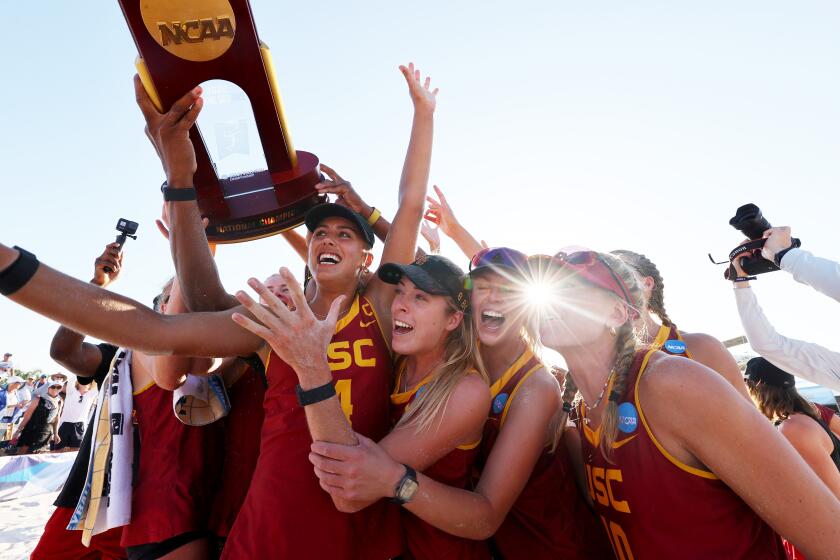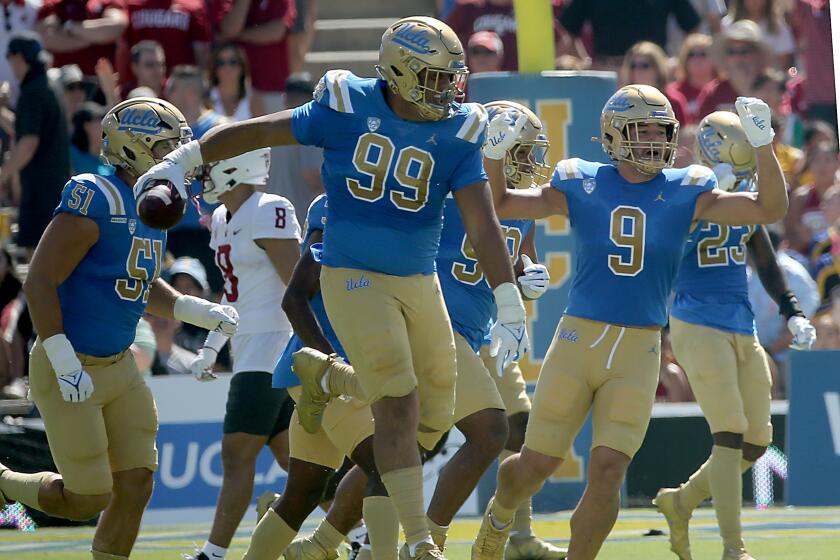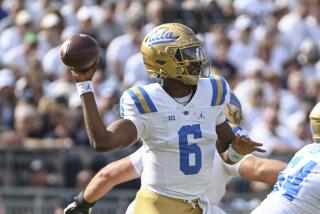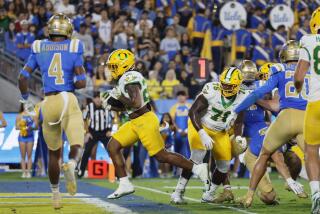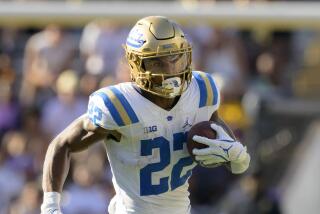Dante Moore’s growing pains take center stage in UCLA’s loss at Oregon State
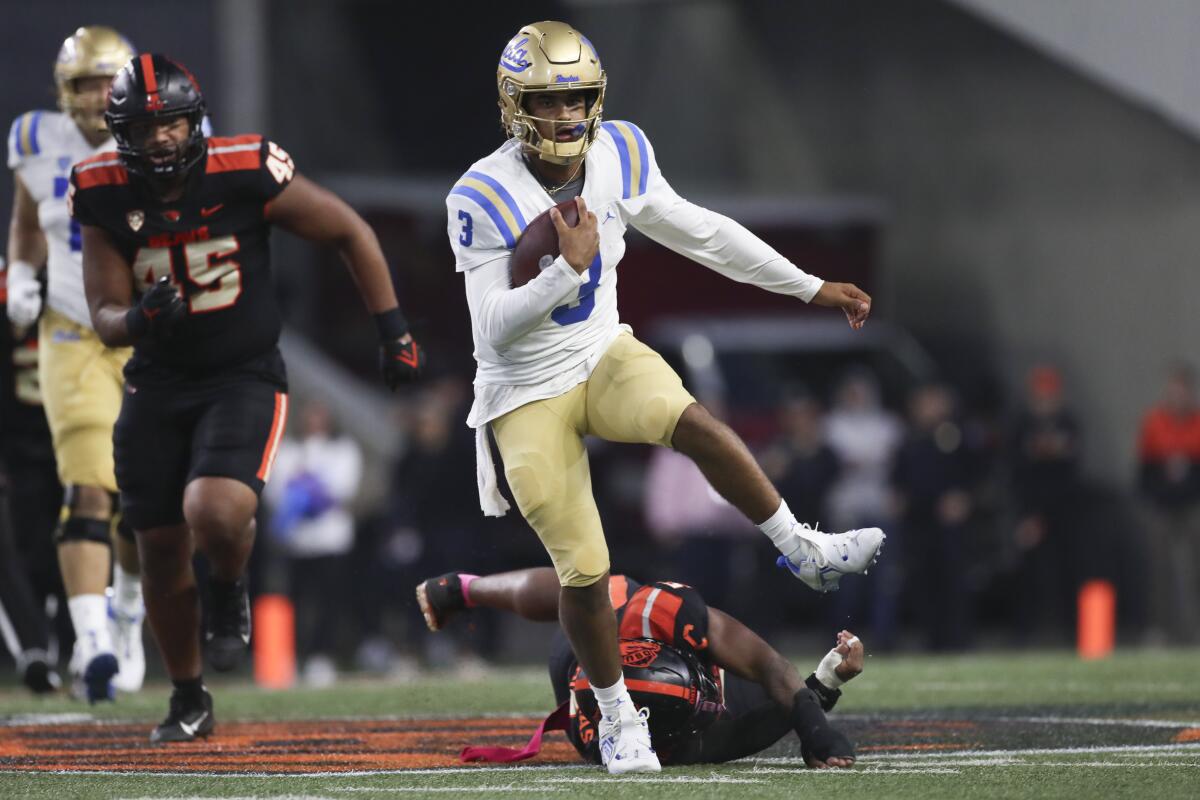
CORVALLIS, Ore. — The education of Dante Moore has resembled a painful lesson written over and over on a blackboard.
It’s hard to win when you throw a pick-six.
It’s hard to win when you throw a pick-six.
It’s hard to win when you throw a pick-six.
For a third consecutive game, the UCLA freshman quarterback had an interception returned for a touchdown.
For the second time in those three games, his team was unable to overcome that critical blunder.
Football teams are deserting the Pac-12 for NCAA megaconferences, but other sports don’t have to follow. Let the Pac-12 live.
This pick-six was one of three passes Moore had intercepted Saturday night at Reser Stadium during the No. 18 Bruins’ dreary 36-24 loss to No. 15 Oregon State that raised more questions about Moore’s decision-making.
In three Pac-12 games, Moore has tallied twice as many interceptions (six) as touchdown passes (three). Even with UCLA’s running game piling up 284 yards and backup quarterback Collin Schlee mixing in effectively as a change-of-pace option before leaving with an injury, the Bruins could not overcome those interceptions.
“They all hurt,” UCLA coach Chip Kelly said, “and we have to clean it up.”
In a fitting end to the Bruins’ comeback hopes, Moore limped off the field after a sequence in which he was sacked on back-to-back plays and his fourth-down pass to Logan Loya was well short of a first down with 15 seconds left.
A shaky showing in which Moore completed 15 of 34 passes for 168 yards with one touchdown to go with those interceptions likely eliminated the Bruins (4-2 overall, 1-2 Pac-12) from conference title contention before Halloween.

“A lot of mistakes on my side,” Moore said. “As a quarterback, can’t turn over the ball. I know just in football in general it happens, mistakes happen, but just gotta keep bettering myself every week.”
Some blame also belonged to UCLA’s defense and perhaps Kelly for his refusal to rely more heavily on his running game in the first half. Running back Carson Steele ran for 82 of his 110 yards after halftime, getting 16 of his 22 carries in the second half.
Kelly wasn’t fully pleased with a run game that averaged 5.7 yards even with Moore getting sacked five times.
“I don’t think it was consistent, that was my point,” Kelly said. “There were a lot of big runs in there but there were some runs where I think we left some meat on the bone.”
For the first time this season, the Bruins’ defense bent a bit, giving up multiple touchdowns to an opposing offense. Twice, UCLA blew coverages on Oregon State tight end Jack Velling that resulted in touchdowns, including a 32-yard score that gave the Beavers a 36-17 lead late in the third quarter.
“Busted coverage,” Bruins linebacker Oluwafemi Oladejo said.
Kelly’s weeklong warnings about play-action passes couldn’t prevent the Bruins from getting burned on a 43-yard connection from D.J. Uiagalelei to Silas Bolden that gave Oregon State a 29-10 lead early in the third quarter.
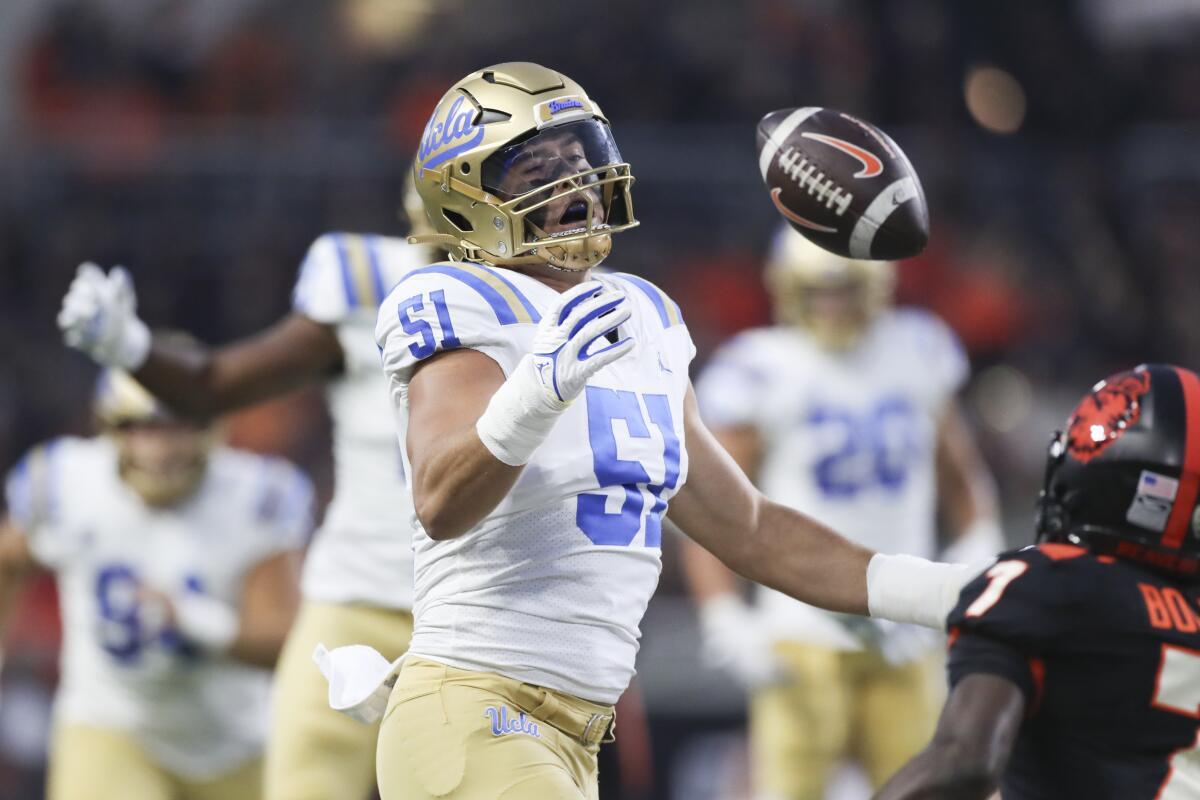
But Moore’s mistakes were the primary culprit in UCLA’s second loss in its last three games.
The backbreaker came in the final minute before halftime, after Moore had run 16 yards to move UCLA into Oregon State territory. The Bruins were down by only six points. A touchdown could have given them the lead even after Moore had ended two previous drives with interceptions.
Moore took the snap and immediately locked on to his favorite receiver, J.Michael Sturdivant, near the sideline. Beavers defensive back Ryan Cooper Jr. read the play and got a jump on the pass, snagging it on his way to a 67-yard interception return for a touchdown.
Breaking down all the transfers on the Bruins’ roster and how that has helped turn them into one of the top defensive units in college football.
Oregon State’s lead was 23-10 and the pats on Moore’s helmet as he walked back to the sideline could not console him.
Moore continued another bad habit of throwing the ball up for grabs while being hit, leading to an interception late in the first quarter.
There were moments of promise as well. Moore converted several fourth-down plays and fired a nifty 10-yard touchdown pass to Loya while under heavy pressure in the second quarter.
Schlee was an effective alternative, especially on a five-play, 69-yard drive in the third quarter that exclusively featured runs. Schlee contributed a 28-yard carry to the Beavers’ nine-yard line. Running back T.J. Harden ran into the end zone on the next play, pulling UCLA within 29-17.
But Schlee sustained an unspecified injury and did not play in the fourth quarter, leaving his status uncertain for next weekend at Stanford.
“The way Collin is, he’s a playmaker, he does a wonderful job with the football in his hand, he makes a lot of people miss, he can throw the ball,” Moore said, “and really just having him run the ball and having me throw the ball, I feel like that’s a great duo to have.”
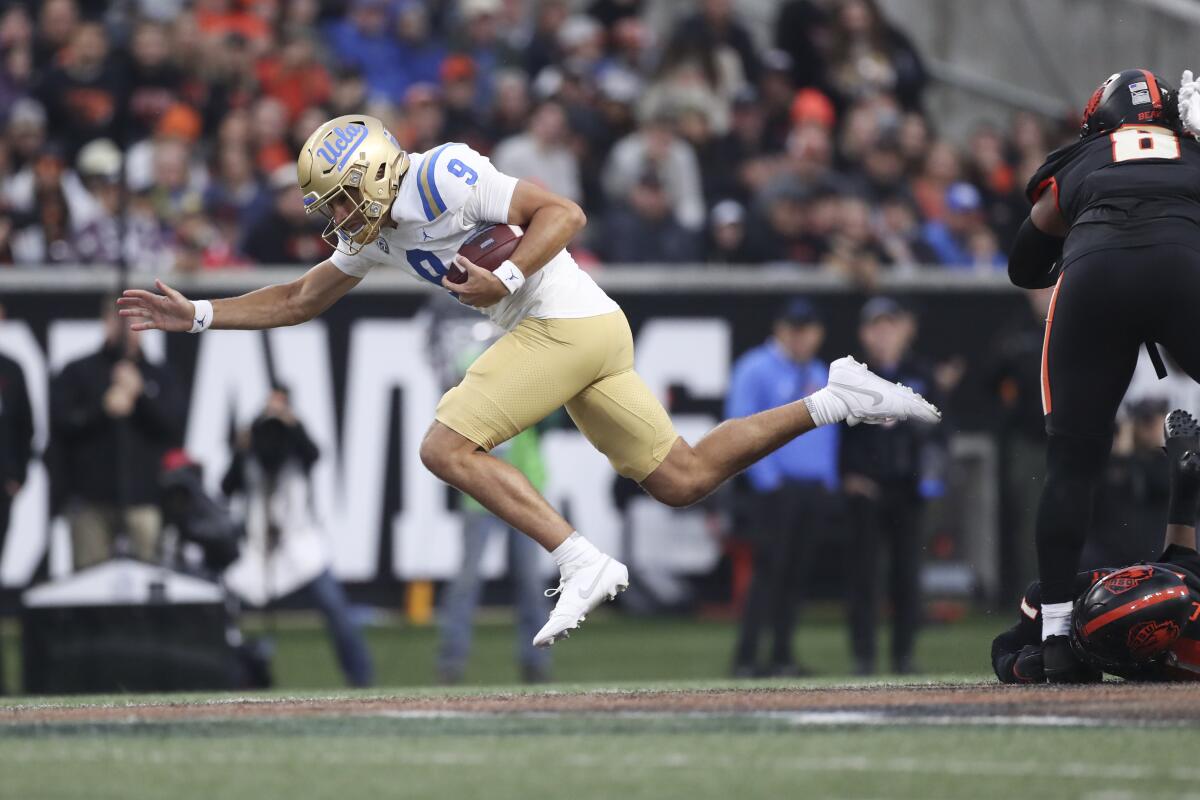
Moore’s growing pains continued practically from the opening kickoff. For the third consecutive game, he had a pass intercepted on the first drive. This time Moore made the mistake of throwing across his body while rolling out on consecutive plays.
On the first play, Moore’s pass nearly was intercepted by Oregon State safety Akili Arnold. On the next play, Arnold made the interception and returned it 13 yards to UCLA’s 33-yard line.
It was the start of a dreadful evening that didn’t get much better for the Bruins. The pain will follow them into the film room for repeated viewings in which Kelly will seek ways to coax more consistency from his quarterback.
“He’s a resilient kid and that’s one thing that’s a great quality of his,” Kelly said. “We’re going to sit down and watch the film with him and go over what his decisions were when he had the ball and how those things happened and we’ll continue to grow as a football team.”
More to Read
Go beyond the scoreboard
Get the latest on L.A.'s teams in the daily Sports Report newsletter.
You may occasionally receive promotional content from the Los Angeles Times.

